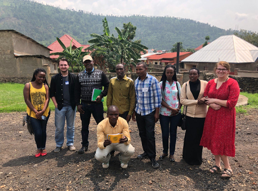
By: Emmy Goering
Just a few weeks ago, six other students and I traveled to the African country of Rwanda with Dr. Herb Smith as part of our interterm class. We met several times prior to the trip to learn about the country we’d be visiting, and I was shocked by its violent history. Just 24 years ago, in 1994, Rwanda found itself in the midst of a genocide. About 800,000 people were murdered in the span of only 100 days. This racial-fueled rampage left Rwanda a completely different country.
Dr. Smith also tried his best to prepare us for the culture shock we’d experience, since, for most of us, we would be in the racial minority for the first time in our lives. He also walked us through the logistics of traveling to a country halfway around the world and tried to prepare us for the amazing adventure that we had in store. We left MC at 4 A.M. to catch an early flight from Wichita to Washington, D.C. The next day was another early morning and long travel day with a fourteen-hour flight from D.C. to Addis Ababa, Ethiopia. From there, we flew four more hours to the capital city of Rwanda, Kigali. Although we spent a lot of time getting to our destination, the experience we would gain would prove to be more than worth the effort.
On our first full day in Kigali, we visited a memorial museum dedicated to remembering the genocide victims and telling their stories. The sheer number of people who had been killed is hard to fathom, but as I looked at pictures and learned more about the victims, I felt overwhelmed by the many tragedies. Because the horror had occurred so recently, many of the people working in the museum had been affected by the genocide, having lost friends and family members. One of our drivers shared his story from the genocide. As a young boy, he had come home from school one afternoon to find his family missing. He knew that if he was to survive, he’d have to leave so he struck out on his own. He eventually fled to the Republic of the Congo during the conflict and found safety. 800,000 others weren’t so lucky.
On a lighter note, one of my favorite experiences from the trip was our visit to Akagera National Park along the border of Tanzania. According to its website, Akagera is the last remaining refuge for savannah-protected species like zebras, giraffes, elephants, and baboons. I had hoped that we’d get to see some of the wildlife up close, but I could never have imagined just how close we’d be. In fact, I have some photo bursts of a young elephant practicing his charge technique with the vehicle in front of us. It was remarkable!
This trip wasn’t all about sightseeing, however. Our group was asked to spend three days with Rwandans at varying levels of English proficiency. Rwanda is quickly making a name for itself in their educational advancements, so it was exciting to be a small part of this effort. My group met with university students and highly-educated adults who needed practice with their pronunciation and conversational English skills. We spent time just talking with students, practicing certain words and common phrases, as well as reading aloud. On the last day of class, we produced a deck of cards and the students giggled with excitement. The students quickly picked up our instructions, and we laughed together over several silly games of Go Fish. Their enjoyment of this little glimpse of Western culture gave me a new perspective. In those moments, our “differences”–in culture, in backgrounds, in understanding–transformed in a new, shared reality. Although our return trip was just as long, Rwanda no longer seems so far away.








